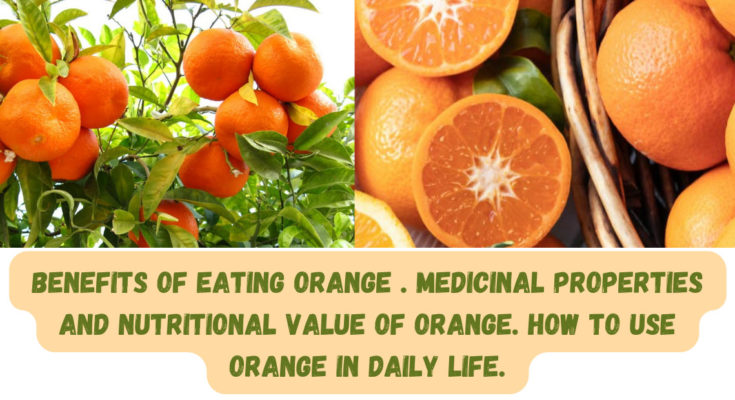An orange is a citrus fruit that is round in shape and typically orange in color, although some varieties may be green or yellow. Oranges are a good source of vitamin C and fiber, and are often consumed fresh or used to make juice, jams, and other products. The fruit is also commonly used as a flavoring or ingredient in a variety of dishes and desserts. Oranges are grown in many countries around the world, including the United States, Spain, Brazil, and China.Here are some of the potential health benefits of oranges:
HEALTH BENEFITS OF ORANGE:-
Oranges are a popular citrus fruit that are well known for their tangy taste and vibrant color. They are packed with essential vitamins, minerals, and nutrients that offer a range of health benefits. Some of the most notable health benefits of oranges include:
1. Rich in Vitamin C: Oranges are an excellent source of vitamin C, which helps to boost the immune system, promote wound healing, and improve skin health.
2. Antioxidant properties: Oranges are rich in antioxidants like flavonoids and carotenoids, which help to protect the body from damage caused by harmful free radicals.
3. Good for heart health: Oranges are low in saturated fat, sodium, and cholesterol, and are rich in potassium, which can help to reduce the risk of heart disease.
4. Promotes digestion: Oranges are rich in fiber, which helps to promote healthy digestion and prevent constipation.
5. Good for skin health: The vitamin C in oranges helps to promote collagen production, which is essential for healthy skin, and can help to reduce the signs of aging.
6. May help reduce cancer risk: Oranges contain compounds like limonoids and hesperidin, which have been shown to have anti-cancer properties and may help to reduce the risk of certain types of cancer.
Overall, incorporating oranges into your diet can offer a range of health benefits, making them a great addition to a healthy and balanced diet.
USES OF ORANGE:-
Oranges have a variety of uses, including:
1. Consumption: Oranges are a popular fruit that are often eaten fresh, juiced, or used in recipes for drinks, desserts, and savory dishes.
2. Vitamin C source: Oranges are a great source of vitamin C, which is an essential nutrient for maintaining a healthy immune system and preventing scurvy.
3. Skincare: Orange peels contain compounds that can help to brighten and smooth the skin when used in skincare products.
4. Aromatherapy: Orange essential oil is often used in aromatherapy to promote relaxation and reduce stress.
5. Cleaning: The acidity of oranges can make them effective at cleaning and removing stains. The juice and peels can be used as a natural cleaning solution for surfaces, such as countertops and floors.
6. Decoration: Oranges can be used as a natural decoration for events, such as Thanksgiving and Christmas. They can be used to make centerpieces, wreaths, and garlands.
7. Medicine: Orange juice can be used as a natural remedy for sore throats and coughs. The fruit is also believed to have anti-inflammatory and antioxidant properties that may help to prevent chronic diseases, such as heart disease and cancer.
8. Insect repellent: The scent of oranges can help to repel insects, such as mosquitoes and ants. Orange peels can be used as a natural insect repellent in gardens and outdoor spaces.
MEDICINAL PROPERTIES:-
Oranges have been used in traditional medicine for centuries for their medicinal properties. Here are some of the medicinal properties of oranges:
1. Anti-inflammatory properties: Oranges contain flavonoids and other compounds that have anti-inflammatory properties, which can help to reduce inflammation in the body.
2. Anti-cancer properties: Oranges contain compounds like limonoids, beta-carotene, and flavonoids, which have been shown to have anti-cancer properties and may help to prevent the growth and spread of cancer cells.
3. Immune-boosting properties: Oranges are rich in vitamin C, which is a powerful antioxidant that helps to boost the immune system and protect the body against infections.
4. Cardiovascular health: Oranges are rich in potassium, which can help to reduce blood pressure and lower the risk of heart disease.
5. Digestive health: Oranges contain fiber, which can help to improve digestion and prevent constipation.
6. Respiratory health: Oranges contain compounds that may help to reduce inflammation in the lungs and improve respiratory health.
7. Skin health: Oranges contain vitamin C and other compounds that help to promote collagen production, which is essential for healthy skin.
Overall, oranges have a range of medicinal properties that make them a valuable addition to a healthy diet. However, it’s important to note that while oranges can provide health benefits, they should not be used as a substitute for medical treatment or advice from a healthcare professional.
NUTRITIONAL FACTS:-
Oranges are a nutrient-dense fruit that are packed with vitamins, minerals, and other beneficial compounds. Here are some of the key nutritional facts about oranges:
i. Calories: A medium-sized orange contains about 60-70 calories.
ii. Carbohydrates: Oranges are primarily composed of carbohydrates, with a medium-sized orange containing around 15 grams of carbohydrates, including 12 grams of natural sugar.
iii. Fiber: Oranges are a good source of dietary fiber, with a medium-sized orange containing around 3 grams of fiber.
iv. Vitamin C: Oranges are well-known for their high vitamin C content, with a medium-sized orange providing over 70% of the recommended daily intake of this important nutrient.
v. Other vitamins: Oranges also contain other important vitamins, including vitamin A, vitamin B6, thiamine, and folate.
Vi. Minerals: Oranges are a good source of minerals like potassium, calcium, and magnesium.
vii. Water: Oranges are composed mostly of water, with a medium-sized orange containing around 120 ml of water.
Overall, oranges are a great source of vitamins, minerals, and fiber, making them a healthy addition to any diet.
Here is a more detailed nutritional breakdown of oranges based on a medium-sized fruit (approximately 154 grams) with skin removed:
- Calories: 62
- Carbohydrates: 15.4 g
- Fiber: 3.1 g
- Sugars: 12.2 g
- Protein: 1.2 g
- Fat: 0.2 g
- Vitamin C: 70.1 mg (117% DV)
- Vitamin A: 295 IU (6% DV)
- Folate: 40 mcg (10% DV)
- Thiamine (Vitamin B1): 0.1 mg (7% DV)
- Potassium: 237 mg (7% DV)
- Calcium: 52 mg (5% DV)
- Magnesium: 16 mg (4% DV)
Oranges are low in calories and fat but high in fiber and vitamin C. They also contain significant amounts of potassium, vitamin A, folate, and other essential vitamins and minerals. Additionally, oranges are a good source of antioxidants like flavonoids and carotenoids, which have been shown to have a range of health benefits.
HOW TO USE IN OUR DAILY LIFE:-
There are many ways to use oranges in cooking, baking, and other culinary applications. Here are some ideas for how to use oranges:
1. Eat them as a snack: Oranges make a great portable snack that can be enjoyed on the go.
2. Add them to salads: Oranges add a sweet and tangy flavor to salads and pair well with ingredients like fennel, spinach, and nuts.
3. Make orange juice: Oranges can be juiced to make a refreshing and nutritious drink that is rich in vitamin C.
4. Use them in marinades: Orange juice and zest can be used in marinades for meats or seafood, adding a citrusy flavor and tenderizing the meat.
5. Bake with them: Orange zest can be added to cakes, cookies, and other baked goods to add a bright and flavorful twist.
6. Make marmalade: Orange marmalade is a delicious spread that can be enjoyed on toast, scones, or biscuits.
7. Grill them: Grilled oranges make a tasty and visually appealing addition to salads, desserts, and other dishes.
8. Infuse water with them: Adding sliced oranges to water can give it a subtle citrus flavor and make it more refreshing.
Overall, there are many creative ways to use oranges in cooking and other applications. Experiment with different recipes and techniques to discover new ways to enjoy this versatile and nutritious fruit



